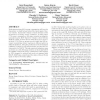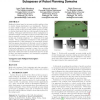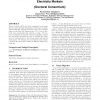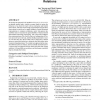ATAL
2015
Springer
8 years 7 months ago
2015
Springer
We consider an autonomous agent facing a partially observable, stochastic, multiagent environment where the unknown policies of other agents are represented as finite state contr...
ATAL
2015
Springer
8 years 7 months ago
2015
Springer
ATAL
2015
Springer
8 years 7 months ago
2015
Springer
ATAL
2015
Springer
8 years 7 months ago
2015
Springer
We discuss bribery as a rational behaviour in two player bi-matrix games in game settings, where one player can assign the strategies to the other player. This can be observed as ...
ATAL
2015
Springer
8 years 7 months ago
2015
Springer
Reducing an automobile’s energy consumption will lower its dependency on fossil fuel and extend the travel range of electric vehicles. Automobile Climate Control Systems (CCS) a...
ATAL
2015
Springer
8 years 7 months ago
2015
Springer
Making decisions based on accurate models enables robots to exploit domain knowledge to act intelligently. However, in many realistic domains, it is impossible to have globally ac...
ATAL
2015
Springer
8 years 7 months ago
2015
Springer
Electric Vehicles (EVs) and their integration in the smart grid are challenges that sustainable societies have to tackle. Uncontrolled EV charging increases peak power demand, whi...
ATAL
2015
Springer
8 years 7 months ago
2015
Springer
We investigate the effects of market making on market performance, focusing on allocative efficiency as well as gains from trade accrued by background traders. We employ empirica...
ATAL
2015
Springer
8 years 7 months ago
2015
Springer
We present an approach to the problem of learning by observation in spatially-situated tasks, whereby an agent learns to imitate the behaviour of an observed expert with no intera...
ATAL
2015
Springer
8 years 7 months ago
2015
Springer
How to form a team for achieving a given set of tasks is an important issue in multi-agent systems. Task-oriented team formation is the problem of selecting a group of agents, whe...




